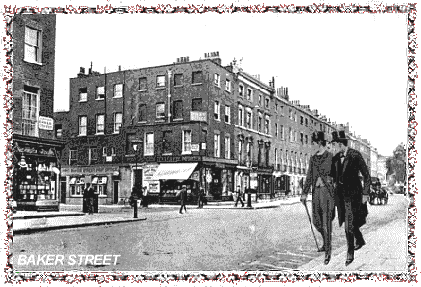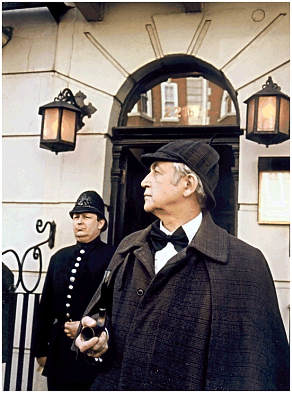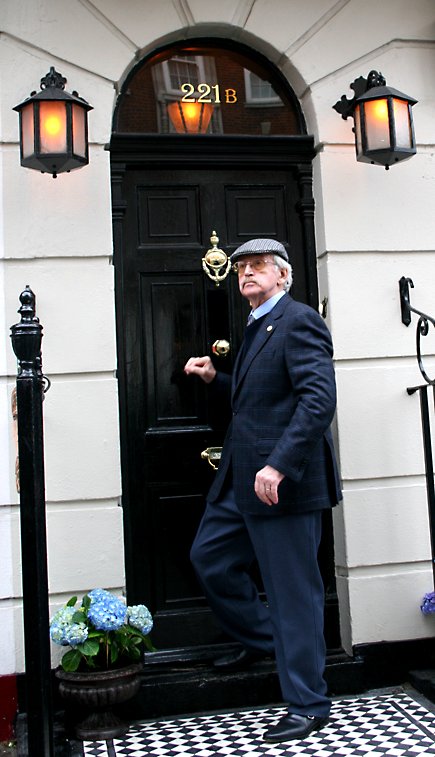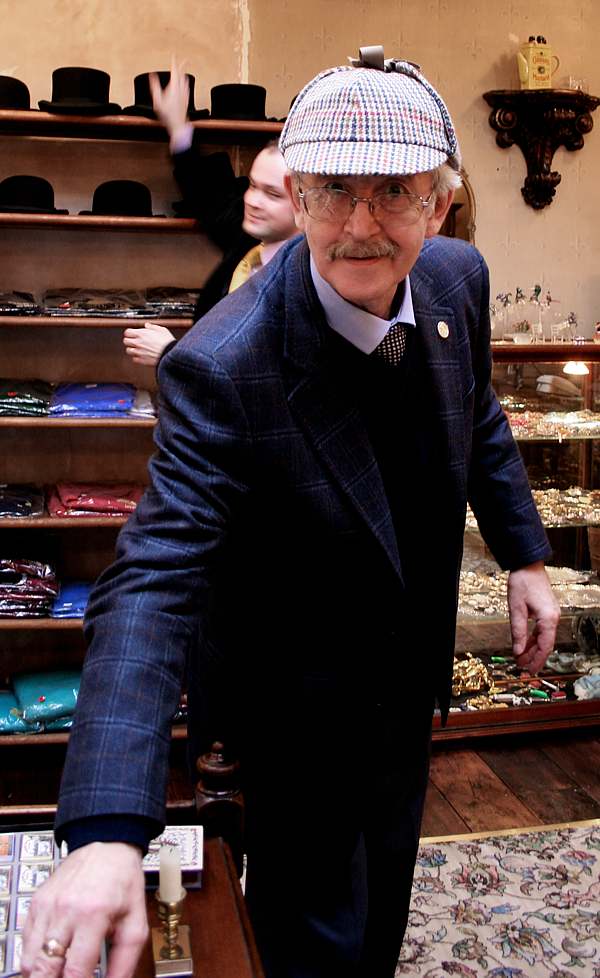The Sherlock Holmes Museum

Sherlock Holmes and Doctor Watson lived at 221b Baker Street between 1881-1904, according to the stories written by Sir Arthur Conan Doyle. The house was last used as a lodging house in 1936 and the famous 1st floor study overlooking Baker Street is still faithfully maintained as it was kept in Victorian Times.


SHERLOCK HOLMES
Consulting Detective
PERSONAL: ¤ Born c. 1854; retired late early 1904 after 23 years of active practice. ¤ Descendant of country squires; grandson of a sister of the French artist Emile Jean Horace Vernet. World's first Consulting Detective. Worked for the love of his art rather than for the acquirement of wealth. Professional charges were upon a fixed scale. "I do not vary them, save when I remit them altogether."
PROFESSIONAL EXPERIENCE: 1878 began professional career as a detective. 1882 Began professional partnership with Dr. Watson. Between 1878 - 1889 investigated some 500 cases "of capital importance" 1878 - 1891. Devoted to exposing & breaking up criminal organization of Prof. Moriarty. 1894 Returned to active practice 1894 - 1901 Handled hundreds of cases. 1895 Private audience with Queen Victoria, for services to England June. 1902 Refused offer of knighthood. 1903 - 1904 Began retirement in solitude in a villa on the Sussex coast overlooking the English channel, reviewing the records of cases and the destruction of those which might compromise more exalted clients. "The approach of the German war caused him, however, to lay his remarkable combination of intellectual and practical ability at the disposal of the government" with the result of communicating much false intelligence to the Germans, and arrest of Prussian spymaster Von Bork
CHARACTER: "Dual nature" of personality: "Nothing could exceed his energy when the working fit was upon him; but now and again a reaction would seize him, and for days on end he would lie upon the sofa in the sitting-room, hardly uttering a word or moving a muscle from morning to night." ¤ During these moods, alternated "between cocaine and ambition, the drowsiness of the drug and the fierce energy of his own keen nature", then an even blacker depression took hold of him in reaction to the narcotics, from which he could only be rescued by a case ¤ His own powers became irksome when not in use: "My mind rebels at stagnation", and he chafed and brooded over "the insufferable fatigues of idleness" ¤ "My mind is like a racing engine, tearing itself to pieces because it is not connected up with the work for which it was built" ¤ Hasd an 'animal lust for the chase': "The man is nothing, the work everything" ¤ "Work is the best antidote to sorrow"; "a change of work is the best rest."
APPEARANCE AND CONSTITUTION: ¤ Tall, thin; narrow face, large forehead, black hair, brows dark & heavy ¤ Nose thin, hawk-like; lips thin, firm; voice quick, high, strident ¤ Eyes gray, sharp, piercing, taking on "far-away introspective look" ¤ Seldom take exercise for its own sake, yet "always in training" ¤ A good runner; possessed of strength which one would hardly credit ¤ "I am exceptionally strong in the fingers"; "grasp of iron" ¤ Few men were capable of greater muscular effort ¤ "An abnormally acute set of senses"; "extraordinary delicacy of touch" ¤ "Frugal"; habits "simple to the verge of austerity"; "Idleness exhausts me completely" yet from time to time spend whole days in bed ¤ "Catlike love of personal cleanliness"; quiet primness of dress ¤ Normally dressed in conventional tweeds or frock-coat ¤ Occasionally don an Ulster; dressing-gown in privacy of own rooms ¤ In country, a "long gray travelling-cloak" with close-fitting, ear- flapped, cloth "travelling cap" ¤ Late riser as a rule "save upon those not infrequent occasions when he was up all night" during which up early on a case, vigorous and untiring, going for days or even a week without rest ¤ Diet, spare at the best of times, abandoned altogether when working ¤ "I am a brain, Watson. The rest of me is a mere appendix." ¤ State of health "not a matter in which he took the faintest interest." ¤ Wiry, iron constitution; suffered breakdown from nervous prostration in Spring 1887; ordered to take complete rest in March 1897 due to "constant hard work of a most exacting kind, aggravated, perhaps, by occasional indiscretions of his own" ¤ In retirement, somewhat crippled by occasional bouts of rheumatism ¤ Took up swimming, nonetheless; little or no knowledge of amateur sports ¤ Baritsu (Japanese self-defense); boxing expert; excellent swordsman; enjoy fishing in the Broads near Donnithorpe; knowledge of golf clubs; singlestick expert.
PUBLICATIONS: ¤ Author of a number of monographs, all of them on technical subjects ¤ Upon the Distinction Between the Ashes of the Various Tobaccos ¤ Monograph on polyphonic motets of Lassus, printed for private circulation, said by some experts to be the last word on the subject ¤ Two short articles on ears in the Anthropological Journal ¤ A "trifling" monograph upon the subject of secret writings, 160 separate ciphers analyzed ¤ Monograph upon the dating of documents ¤ A contribution to the literature of tattoos ¤ Monograph upon the tracing of footsteps ¤ Monograph upon the influence of the trade upon the form of the hand ¤ The Book of Life, the "somewhat ambitious" title of an article written for an English magazine, attempting to show how much an observant man might learn by accurate and systematic examination of all that came in his way ¤ Practical Handbook of Bee Culture ¤ Francois le Villard translated some of these works into French
PROFESSIONAL KNOWLEDGE: ¤ Minute knowledge of the history of crime ¤ Immense knowledge of "sensational literature"; "appears to know every detail of every horror perpetrated in the century" ¤ The higher criminal world of London; details of Continental crime ¤ Disguises, wearing and recognizing: "It is the first quality of a criminal investigator that he should see through a disguise" ¤ See publications on: tobacco ashes, shapes of ears, cryptography, dating of documents, tattoos, footsteps, influence of trades on form of hands ¤ Dogs ¤ Researches of a "medico-criminal aspect" ¤ An exact knowledge of London ¤ Newspaper types ¤ Perfumes ¤ The typewriter and its relation to crime ¤ Bicycle tyres ¤ Names and trademarks of the world's major gunmaking firms DRESS:
HOBBIES: ¤ Art -- spend some time in Bond Street picture-galleries; "art in the blood is likely to take the strangest forms" ¤ Study of honey-bee, bee-farming upon the South Downs ¤ Special study of the Buddhism of Ceylon (Hinayana) ¤ Cornish Language, conceived the idea that it is akin to the Chaldean, and had been largely derived from the Phoenician traders in tin ¤ Some weeks in a great University town pursuing laborious researches in Early English charters which, it was said, led to some striking results ¤ Study of polyphonic motets of Orlandus Lassus ¤ Deep and continuing interest in the Middle Ages, making special studies in Miracle Plays, a 15th Century Palimpsest, Early English charters, medieval pottery, music (especially Lassus).
An extraordinarily talented violinist! His musical prowess was described in several cases, including the first story, “Study in Scarlet”. In the “Cardboard Box”, we learn that his personal instrument was a genuine Stradivarius. In “The Marzarin Stone” he actually caught the villains by putting on a gramophone recording of violin music (that tricked them into thinking he was in that room). In “The Red Headed League”, Dr. Watson wrote: "Holmes was an enthusiastic musician, being himself not only a very capable performer of no ordinary merit."
| The visit to the Museum of Vasili Livanov on 20th April 2006  |
 |